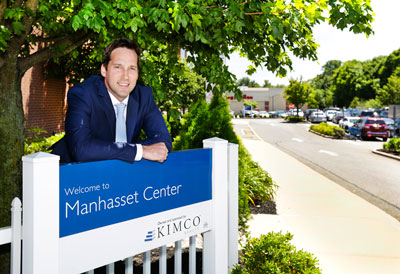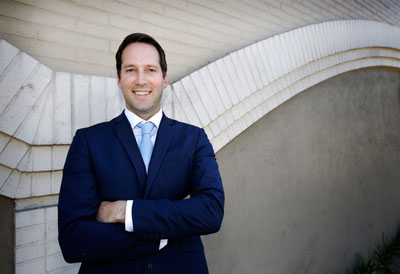New CEO Conor Flynn is helping prepare time-tested retail REIT Kimco for the future.
 To Kimco Realty Corp. (NYSE: KIM) President and CEO Conor Flynn, today’s open-air shopping centers play an increasingly central role in the life of the surrounding community, acting in effect as an alternative main street.
To Kimco Realty Corp. (NYSE: KIM) President and CEO Conor Flynn, today’s open-air shopping centers play an increasingly central role in the life of the surrounding community, acting in effect as an alternative main street.
He developed that perspective during a 13-year tenure at the company during which he held various management positions, including COO and chief investment officer. Flynn took over as CEO of Kimco and its portfolio of 550 shopping centers in January 2016. He replaced David Henry, who retired after leading the company for six years.
REIT magazine spoke with Flynn about how his previous roles at Kimco prepared him for the top job, the importance of creativity in the retail sector and the rapid gains the company has made in its sustainability initiatives.
REIT.com: You started at Kimco in 2003 as an asset manager. How has your range of experience at the company shaped your perspective as CEO?
Conor Flynn: The various positions I held allowed me to learn the shopping center business from the ground up. It gave me a unique view into how all of the pieces of Kimco fit together; what its strengths are and what still needs to be improved upon. By participating in leasing, underwriting, transactions, due diligence, budgeting, capital markets and investor relations, a clearer picture emerges as to what it takes to manage a company of Kimco’s size and reputation.
REIT.com: How would you compare Kimco today with where it stood five years ago?
Flynn: The word we love to use is transformed.
Five years ago, we had a large international footprint, mostly located in Mexico and Canada, but we lacked an operating platform that would allow us to control our own destiny. Today we are out of Mexico and on the verge of completing our exit from Canada.
Five years ago, in the United States we had a very scattered portfolio of 816 properties of varying quality across 44 states. Today, we are essentially a U.S.-only shopping center company tightly clustered around major metro markets with superior demographics and growth opportunities.
As part of our simplification strategy, we have fewer joint ventures than we had five years ago and, as a result, more control over our assets. By the end of this year, close to 90 percent of our net operating income (NOI) will come from wholly owned assets, a significant change.
From a balance sheet perspective, we have reduced leverage and are better able to weather downturns and strike when opportunities present themselves.
Finally, we are placing a greater emphasis on development and redevelopment opportunities, which we believe present the best opportunities for future growth and value.
REIT.com: What are some of the highlights of Kimco’s “2020 vision?”
Flynn: We really want to focus on transforming the portfolio, to be clustered even tighter around those metro markets that I referred to earlier. We have identified those key markets where we have scale, so we want to take advantage of that and become even more efficient. This is where development and redevelopment opportunities will help to unlock value for our shareholders.
[The year] 2020 is when we really bring on line our signature series of large-scale developments and redevelopments. These are projects that we consider needle-movers. For example, some key redevelopments include our $250 million-plus, 17-acre Pentagon Centre project in Pentagon City, Virginia, and the $150 million-plus Hylan Boulevard project in Staten Island, New York.
We’re really focusing on the highest and best use of the real estate and the strong risk-adjusted returns that come from redevelopment.
Up Close
Family: Married with one child.
Education: Yale University economics degree; Columbia University master’s degree in real estate development.
Hobbies: Golf, tennis and paddle boarding.
Professional Activities: Member of ICSC, NAREIT and The Real Estate Roundtable.
Currently Reading: “A Passion For Leadership,” by Robert Gates.
Favorite Vacation Spot: Watch Hill, Rhode Island.
Our development projects are fewer in number, but they are large in scale. An example is Dania Beach in the Fort Lauderdale, Florida, area, where we’ll be adding close to 1 million square feet of retail, in addition to two office towers, two hotels and two residential towers. That’s a very large and exciting project for us immediately adjacent to our Oakwood Plaza center, which is our largest and most successful asset in our southeast portfolio. When Dania is completed, we will control almost two miles of prime real estate along the I-95 corridor adjacent to the Fort Lauderdale airport.
We’ve also made it a goal to continue to strengthen our balance sheet, and part of our 2020 Vision is to improve our overall credit rating from triple-B-plus to A-minus level.
REIT.com: How is Kimco approaching high-profile retailer bankruptcies?
Flynn: The nice thing about Kimco is how diversified we are from a tenant perspective. In 2001, Kmart used to account for 14 percent of our annual base rent (ABR), now it is only 1 percent and continues to shrink. Sports Authority is currently 1.3 percent of ABR.
We look at those potential vacancies as opportunities. In fact, we are 98.2 percent occupied when it comes to boxes of 10,000 square feet or more. We’ve already seen significant demand for those Sports Authority boxes and have redeveloped a large number of former Kmart boxes with the likes of Whole Foods and other great retailers.
REIT.com: Should we expect to see much activity on the acquisition front?
Flynn: Probably not. We’re still seeing all-time-low cap rates, especially in the top markets. It’s very hard to make money in today’s environment if you are paying full price at a point in the cycle where everybody seems to be looking for the same high-quality, high-barrier-to-entry product. We’ve seen sovereign wealth funds and international players come in recently to really go after some of the high-quality acquisitions.
That said, we are ready to strike if unique opportunities present themselves.
REIT.com: Grocery stores comprise about 72 percent of Kimco’s portfolio. Is there room to grow that share?
Flynn: Yes. We actually think there’s opportunity in the Sports Authority boxes. Half of the Sports Authority boxes are in centers that don’t have a grocery component. We think we have an opportunity to add a grocery store if and when the leases come back to us.
Specialty grocers—whether it’s Sprouts, Trader Joes, FreshThyme Farmer’s Market—are still very active, as are traditional grocers. We have a lot of deals working, especially in redevelopments, where we can have grocery anchors in centers where there wasn’t one before.
REIT.com: Which tenant segments are showing the strongest growth potential?
Flynn: The two strongest are fitness and off-price retail. Health and wellness continues to be a focus these days. People are really connected to the different gyms that they go to, and then all the surrounding retail that goes with that—whether it’s vitamins, juices, pilates, yoga, organic grocers, you name it.
Off-price retail continues to be white hot in terms of the expansion opportunities. TJX is clearly the belle of the ball. You’ve also got Ross Dress for Less, Nordstrom Rack, Saks Off Fifth, Burlington and Macy’s Backstage taking a lot of share from the department stores.
 REIT.com: What role does the open-air shopping center play today within its surrounding community?
REIT.com: What role does the open-air shopping center play today within its surrounding community?
Flynn: People are tending to gravitate toward the open-air shopping center today because of the safe, campus-type environment that is extremely welcoming. It’s becoming almost like the main street where people want to be. We’re still a very social society, and that’s what we’re trying to foster. It’s about getting people excited to come to the shopping center at all times of the day.
Events are important to that initiative. We always try and partner with the local community, whether it’s the fire department bringing trucks to the center for kids to climb on and take photos, or a visit from Santa and his snow-making machines.
REIT.com: Kimco has two programs in place, Kimco Entrepreneurs Year Start (KEYS) and Leaders Advancing Business Solutions (LABS), to encourage new entrepreneurs as well as promote new ideas from employees. How important is it to foster new ideas in the retail sector?
Flynn: KEYS was something that our team developed when we were in the depths of the recession. The team, out in California, was trying to develop ways to get start-ups opening in our centers.
We offered a full year of free rent to new entrepreneurs. They had to put a business plan together and go through business classes that we sponsored. If they were successful after the initial year, they have the option to stay in the space for the next five years at market rent. We’ve had over 50 percent of our KEYS tenants exercise that option.
With LABS, we wanted to use the power of creativity here at KIMCO to see what new ideas our team could come up with. We picked people from all different parts of the company and placed them into five small groups to find ways to increase revenue or reduce expenses. Nothing was off the table. The first LABS season is now coming to an end, and it was such a big success that we’re going to do another one by the end of the year.
LABS is a good way to take a step back from the business to see how we can evolve. At Kimco, we really believe our ability to innovate is limited only by the imagination of our team.
REIT.com: Last year, Kimco was named to the Dow Jones Sustainability North America Index. Has this changed how the company thinks about sustainability?
Flynn: We’re the only retail owner in all of North America in that index, so we feel that’s a great accomplishment, but being added to the index wasn’t the end goal for the program. We always think there’s more to be done.
Kimco launched its sustainability program in 2011. We really wanted sustainability to be another calling card of the company, and we think we’ve been able to achieve that in a relatively short time period. We’ve decreased energy consumption in our centers by over 15 percent in that time period. That’s a big deal for a company our size. It’s mainly been driven by the investments in property efficiency as well as the best practices we’ve adopted.
We’re going to continue to try and reduce same site energy and water consumption. We’re also going to adopt sustainable construction standards across the country. We’re writing our own green building code because when you look at the existing programs out there, they’re really more designed for office than retail. Our goal is to have our green construction standards written by the end of the year, with the goal of a nationwide rollout.
We’re also forging closer relationships with tenants on sustainability. We only control the common areas and building exteriors, so to expand sustainability inside the stores, we need to encourage our tenants to do more. And by our retailers partnering with Kimco, we believe we can really effect positive change.